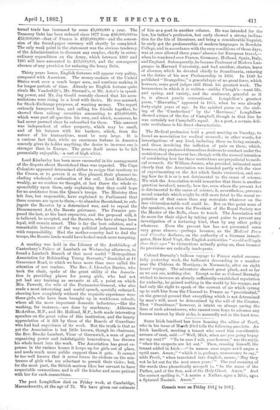The poet Longfellow died on Friday week, at Cambridge, Massachusetts,
at the age of 75. We have given our estimate
of him as a poet in another column. He was intended for the law, his father's profession, but early showed a strong inclina- tion for the life of literature, and being a considerable linguist, he early got the professorship of modern languages in Bowdoin College, and in accordance with the easy conditions of those days, was at once allowed three years' absence for European travel,— when he wandered over France, Germany, Holland, Spain, Italy, and England. Subsequently, he became Professor of Modern Lan- guages in Harvard University, and had another, shorter, leave of absence, which he devoted chiefly to Scandinavia, entering on the duties of his new Professorship in 1836. In 1849 he published "Evangeline," a graceful epic of no great force, which however, some good judges still think his greatest work. The hexameters in which it is written—unlike Clough's—want life, and spring, and variety, and the sentiment, graceful as it is, is almost purely conventional. Longfellow's greatest poem, "Hiawatha," appeared in 1855, when lie was already forty-eight years of age. In the spirited poem on the sink- ing of the 'Cumberland' by the Merrimac,' Longfellow showed a trace of the fire of Campbell, though in that line he was certainly not Campbell's equal. As a poet, a certain deli- cate restfulness is his finest characteristic.














































 Previous page
Previous page